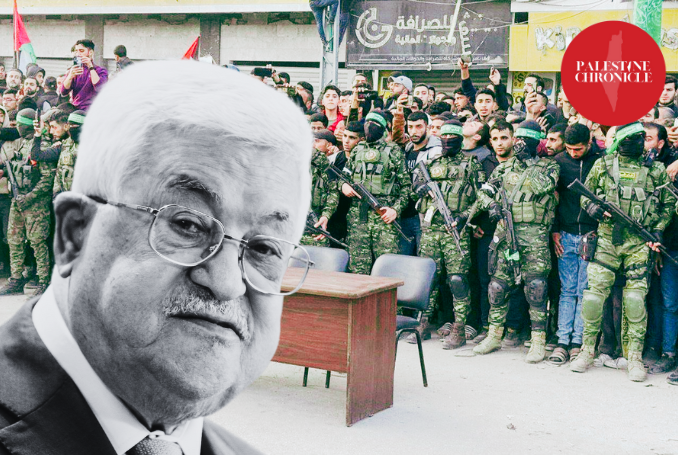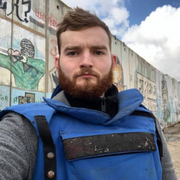
The PA’s President, Mahmoud Abbas, has remained adamant that Hamas should not play a role in the governance of post-war Gaza, which has time and time again led to the collapse of reconciliation talks.
Upon the Gaza ceasefire deal’s ratification by the Israeli Cabinet on January 17, the Palestinian Authority (PA)’s President, Mahmoud Abbas, released a statement proclaiming that preparations had been made to “assume full responsibility in Gaza”. The likelihood of this occurring remains low, however.
Since the beginning of the Gaza Genocide the Palestinian Authority (PA) has been sitting on the sidelines, attempting to weave itself into a potential day-after settlement.
The idea of handing over the Gaza Strip to the Fatah-led PA – that currently maintains partial administrative/security control over a portion of the occupied West Bank – has been discussed between Hamas and PA officials for some time, without any tangible steps being taken towards its implementation.
An Icon of the Second Intifada – Who is Zakaria Zubeidi? – PROFILE
For its part, the PA’s President, Mahmoud Abbas, has remained adamant that Hamas should not play a role in the governance of post-war Gaza, which has time and time again led to the collapse of reconciliation talks between the Ramallah-based authority and Hamas.
The latest round of talks took place in Egypt, close to the New Year, resulting in failure once again and leading to Cairo allowing dialogue on a hybrid form of Gaza governance, which would include roles from Gulf Arab countries.
So far there has been no confirmed model for Gaza’s future governance, although it has appeared that a US-Israeli-favoured technocratic administration, that receives foreign support and works without Hamas, is now prominent in the media discourse.
The Challenge of PA Governance
While a PA administration run out of the Gaza Strip could potentially offer some economic benefits to the beleaguered territory and help lift Western sanctions, therefore easing the Israeli siege, it also comes with a variety of complicating factors.
Hamas has been the administrative power inside of Gaza since 2006. This has meant that the civil society sector – which it had already been building prior to its victory in the legislative elections – along with the territory’s security apparatus, administrative staffers and anyone in positions of power within the territory, have either worked under de-facto Hamas rule or been members of the group.
Despite it being the cheap propaganda of the Israeli and Western corporate media to label the Gaza Health Ministry as “Hamas-run”, as it is staffed by healthcare professionals and not militants as the title lets on, the government under which it operated was a Hamas administration. Similar to how the Israeli Ministry of Health is under the rule of the Israeli government and the Palestinian Health Ministry in the West Bank operates under a PA administration.
Post-Gaza Ceasefire: Israel Prepares to Focus Its War on The West Bank
What this means is that Hamas as a political party is always going to have ties to every sector in Gaza so long as it exists, even if this just means staffers who work in administrative roles. Purging experienced individuals who worked alongside Hamas, making them de-facto part of its administration, many of them without actually being its members, would be a catastrophe and would mean any new administration would have to be fully run by new and relatively inexperienced people.
For example, when the Trump administration takes power in the United States, there will be key changes made in government, but it would be impossible to purge everyone who worked under the past administrations. The US doesn’t purge everyone in its police forces, intelligence agencies, Pentagon, courts, health sector etc. when it changes administration from Democratic to Republican. There are experienced individuals who work in key areas of government and civil society that remain throughout each transitional phase.
In Gaza’s case, they also have a lot fewer people to draw from than an established nation, it is an occupied territory with just over 2 million inhabitants. On top of this, Hamas is the most popular political party amongst Palestinians, and like is the case in every country, some families will have supporters of the Hamas movements, Fatah, or the likes of the Popular Front for the Liberation of Palestine (PFLP) in the same family unit.
This means that completely sidelining Hamas is not possible, especially after the Genocide that has worked to bring the people together and even change the minds of some Palestinians in Gaza who previously despised Hamas for various reasons. The only way to do this is to import new security forces, government officials and experienced individuals from outside of Gaza; to rule the territory. This could end up creating great friction and meet failure if implemented in the wrong way.
The Gaza Dilemma: Can PA Replace Hamas and the Popular Resistance?
During the war, in northern Gaza, the Israelis made a number of attempts to form their own security forces there out of collaborators and there were even reports that PA security force members were even sent there at one point, after an Israeli proposal put forth, plots that were largely foiled by the local population there itself. The Israeli military did however succeed at using criminal gangs in order to exploit the local population in its so-called “safe zone”, working with them directly in southern Gaza to intercept aid trucks.
While the Palestinian Authority had repeatedly released statements that sought to condemn Hamas and blame them for triggering the Israeli genocide, it also appeared to be hedging its bets on an Israeli victory of the Palestinian armed groups in Gaza and hoping to play a role in a Saudi-Israeli normalisation deal.
Mahmoud Abbas and the PA leadership underneath him also failed to perform a positive support role in favor of Gaza throughout the war, which also worked to inflict a greater blow on PA support inside the besieged territory. On the other hand, the Hamas leadership was dying alongside the rest of the population there. While Israeli propaganda tried to suggest that Hamas leaders were living in luxury, protecting their families, or were hiding, as the general population suffered, this narrative collapsed when faced with the objective reality.
Ismail Haniyeh was assassinated and most of his sons, along with various other members of his family, were killed in Israeli airstrikes. As Yahya Sinwar died in a direct battle with the Israeli army and the videos released of his final moments featured him fighting until the very last moment. These examples serve as a sharp contrast to PA leaders who do live comfortably and many with immense wealth.
Weapon of Propaganda – Israeli ‘Mass Rape’ Allegations Continue to Fall Apart
Another issue is that the PA has used the relative stability in the West Bank – when compared with Gaza – as an example of why non-violence and collaboration with the Israeli occupiers are more effective at achieving the goals of the Palestinian national liberation cause.
With the ceasefire/prisoner exchange in Gaza, despite the Israelis inflicting one of the worst crimes in recent memory, there is no internal Israeli occupation or settlements. On the other hand, the West Bank has been destabilized, settlement expansion continues, settler violence is coming to a boiling point and annexing portions of the territory could be imminent. This is all in addition to the unanimous understanding of the Palestinian people that the PA is riddled with corruption.
Israel also may not see the PA as its best pick for Gaza governance and has favored an administration that is run with the help of foreign Arab nations instead, discluding the PA. Another possible option could be to bring in former PA preventative security chief, Mohammed Dahlan, who would run an iteration of the Palestinian Authority in Gaza, but keep it separated from the West Bank.
All of this misses the popular will of Gaza’s people, however, who should and will undoubtedly play the decisive role in the post-war administration? Without the popular cooperation of the general public, no form of governance will work. This appears to be something that both the PA, Israel, and the US, all overlook in their public statements on a post-war Gaza.
(The Palestine Chronicle)

– Robert Inlakesh is a journalist, writer, and documentary filmmaker. He focuses on the Middle East, specializing in Palestine. He contributed this article to The Palestine Chronicle.